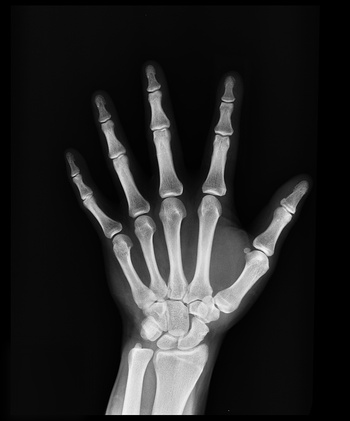HOW DO DOCTORS DIAGNOSE WEAK BONES?
Osteoporosis is best diagnosed by measuring bone density or BMD using a DEXA (dual energy x-ray absorptiometry) scanning machine. This uses low dose x-rays to take a scan of your hip or spine. It is a simple, painless test which takes about 20 minutes.
Smaller and more portable peripheral DEXA (pDEXA) scanners and ultrasound scanners can be used to measure the bone density in areas other than the hip or spine. For example, they may be used to scan your finger, heel or forearm. These scans can then be used to decide whether you need treatment, or whether you should go on to have a hip or spine DEXA scan. DEXA hip scans remain the preferred way to confirm a diagnosis of osteoporosis.
Conventional x-rays are of little help, unless fractures have already occurred. 
Biochemical tests, including blood vitamin D, calcium and phosphorus levels, can be helpful in identifying patients at risk of osteomalacia.
Avascular necrosis of the hips can be diagnosed by an x-ray of the hip joint, or by an MRI scan, that can detect earlier changes. MRI scanners produce computer images of internal organs and the bones using strong magnets and radio waves rather than x-rays.
WILL I BE OFFERED THESE TESTS?
You are most likely to be offered a DEXA bone scan if you not only have IBD, but are also in a higher risk group for other reasons: for example, if you are a postmenopausal woman, have been through an early menopause, or have been taking steroids. Some doctors may measure your bone density even if you do not come into the above categories.
Your doctor may also use a scoring system such as ‘FRAX®’ (produced by the World Health Organisation) and ‘QFracture™’. These take into account a number of clinical features (including age and steroid use) to calculate your chance of breaking a bone over the next 10 years. The results will help your doctor decide if you should be referred for a DEXA scan.
While some experts believe vitamin D and calcium levels should be measured in the blood of IBD patients thought to be at risk of bone disease, there are currently no guidelines available around vitamin D testing for those with IBD.









